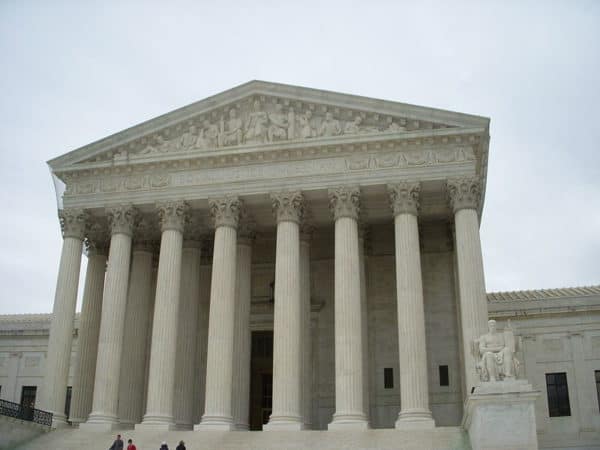The Supreme Court Dodges the Big Issue
Jared Taylor, American Renaissance, June 29, 2009

The Supreme Court.
Conservatives are heralding the Supreme Court’s decision in the Ricci case as a great victory — and it is true that the results of the New Haven firemen’s exam will be accepted and several whites will be promoted to lieutenant and captain. However, as Justice Anthony Kennedy conceded in his majority decision, the court dodged the central question of whether it is constitutional to discriminate against white people in the name of “fairness” for non-whites. This decision is not even half a loaf for whites — it’s only a few crumbs.
As Justice Antonin Scalia pointed out in a concurring opinion, today’s decision “merely postpones the evil day on which the Court will have to confront the [real] question,” namely whether “disparate impact” is legitimate grounds for throwing out employment standards.
The problem is this: In the 1971 Supreme Court decision of Griggs v. Duke Power and in the Civil Rights Act of 1991, our government decided that an employer can be guilty of racial discrimination even if he has absolutely no intention of discriminating. If he has a hiring criterion that is racially neutral in intent — but that weeds out more blacks than whites, that is to say, has a “disparate impact” — he is guilty of discrimination. The purest intentions are no defense. The employer’s hiring criteria are permitted to have a disparate impact only if he can prove that those criteria are a “business necessity” and that there are no other standards he could have used that would have weeded out fewer blacks.
That is a tall order. For example, many police departments used to have a rule that any ex-military man who wanted to be a cop had to have had an honorable discharge. Like so many qualifications, that weeded out more blacks than whites and was not, strictly speaking, a “business necessity” for hiring policemen. It’s probably a good idea to keep dishonorably discharged men off the force, and the rule could have been set up with no thought of race at all — but too bad. Since it kept out more blacks than whites the rule had to go.
The decision in the Ricci case turns on painfully narrow grounds: that the exam the New Haven fire department used was a racially unbiased test of skills that actually are required for fighting fires. The city claimed it wasn’t, and argued that it was obligated to throw out the results because so few blacks passed. The Court said the exam was fine, that the whites should get their promotions, and that blacks have no right to sue on “disparate impact” grounds.
The Court did one useful thing, however. It made it harder to junk test results because of “disparate impact” by saying there had to be a “strong basis in evidence” that the harm this did to whites was justified. But as Justice Ruth Ginsberg pointed out correctly — in what was otherwise a nasty dissent — all this does is set up yet another murky standard that will make it hard for employers to know what is legal and what is not.
Justice Samuel Alito, along with Antonin Scalia and Clarence Thomas, wrote a particularly interesting concurring opinion that was as much journalism as it was law. They noted that New Haven bureaucrats from Mayor John DeStefano on down claimed they had absolutely no desire to discriminate against white people but were acting only to ward off a suit by blacks who were sure to claim “disparate impact.” The justices described in detail, however, the pressure blacks put on the mayor, and how city government pretended to deliberate the question of “disparate impact” even though the mayor and his circle had already decided to throw out the test results for political reasons. As Justice Alito wrote:
[A] reasonable jury could easily find that the City’s real reason for scrapping the test results was not a concern about violating the disparate-impact provision of Title VII [of the Civil Rights Act] but a simple desire to please a politically important racial constituency.
The mayor and his pals were sleazy operators who didn’t give a hoot about either the law or the rights of white firemen. They wanted to please blacks. It is marvelous to have this kind of all-too-common behavior memorialized in a Supreme Court decision.
Of course, the problem of “disparate impact” will never go away. Any test that separates the competent from the incompetent has a disparate racial impact. Everyone knows this. However, it is part of today’s liberal mythology to insist that every racial and ethnic group has exactly the same abilities. Until the country and the Supreme Court accept this and recognize that fair tests have unequal results, there will be no end to this charade.
And we can be sure that every Supreme Court justice Barack Obama appoints will do his best to keep the charade running for decades to come.















